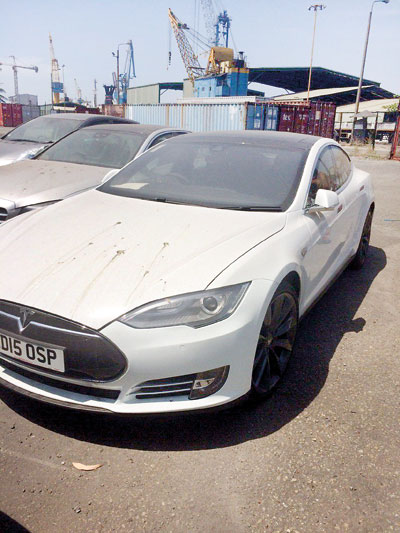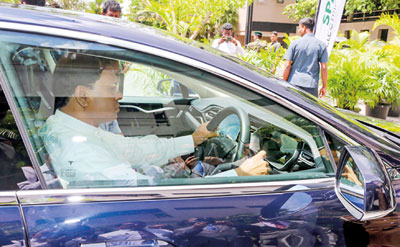News
Tax hikes short-circuit electric car sales, drive investor into debt

No go: Uncleared electric cars at the Colombo harbour
The Government has revised taxes on electric vehicles four times within two years. It has destabilised an emerging market, flung the main importer of electric cars into deep debt and is in direct conflict with efforts by other players within the administration to promote eco-friendly vehicles in the country.
In January 2015, shortly after President Maithripala Sirisena assumed power, the Government slashed the tax on electric cars from 20% to 5%. This meant that duty payable on the popular Nissan plummeted to Rs 180,000, and on the expensive Tesla to Rs 700,000.
President Sirisena provided further impetus to the sector by test-driving an electric car on the sidelines of a convention of environmental professionals. He said he would promote the vehicles among public officials to save both fuel and the environment.
Just one month later, in November, came a dramatic policy reversal. In its Budget for 2016, the Finance Ministry changed the tax on electric vehicles from 5% to over 50%. It was a massive leap and caused turmoil among importers. Last year, only 268 electric vehicles (excluding trishaws) were imported into Sri Lanka, statistics from the Department of Customs show.
Anuruddha Lihinikaduwa, a father of three, had created the SPARK EV brand in Sri Lanka, at the age of 32. His company, Electro Automotive (Pvt) Ltd (EAPL), imported and distributed all brands of electric vehicles. The business had grown sufficiently for him to invest in an aftercare facility and in fast-charging units from the Netherlands. Unlike other importers, the Company dealt solely in electric vehicles.
New registrations were rising, with Nissan Leaf leading the way. Statistics from the Department of Motor Traffic pointed to a year-on-year growth of 3,600% in May 2015, when compared with the corresponding period the previous year. The Power and Energy Ministry promoted charging stations to cut the fuel import bill.
The overnight increase in taxes left Mr Lihinikaduwa reeling. However, he and other importers found solace in a public declaration by President Sirisena that he would have the revision revoked. Cabinet Spokesman Gayantha Karunatileka also said the Government had decided not to press ahead with the import tax on electric cars. In December, the Vehicle Importers’ Association of Sri Lanka welcomed the movement in a statement.
The promise was not kept. The Finance Ministry hiked the tax above 50% and Mr Lihinikaduwa saw the price of vehicles he had opened letters of credit (LCs) for as far back as September 2015, skyrocketing. Some vehicles were en route to Sri Lanka, while others were in port.
EAPL was now faced with refunding customers who did not want or, did not have the means to buy the vehicles at the new prices. But the Company had already re-invested the money in the business. So, Mr Lihinikaduwa wrote an impassioned appeal to Prime Minister Ranil Wickremesinghe, pleading for the tax to be revoked.
“It was with the visionary ideas of the current Government that I invested in the developing of the industry,” he said. “I am now stuck in limbo with no idea as to what the future may bring.”
“Being unable to deliver the promised vehicles on time, I am returning advances and getting into debt on a daily basis,” he continued. “This volatility and indecision is detrimental to all businesses.” His entreaties bore no fruit.
The duty and customs charge on a Nissan Leaf leaped from Rs 187,000 to Rs 2.7 million. The taxes on a Tesla rose from Rs 700,000 to Rs 10 million. The Company had taken advances from customers. Now, with the prices having gone through the roof, they could no longer sell the cars they had ordered.
One reason was that electric vehicles were new to the market. Consumers had bought them predominantly for their low price. “It was a new concept and there was insufficient infrastructure,” said Nuwanthi Kahandaliyanage, Anuruddha’s wife and a company spokesperson. “Someone who had ordered an electric car for Rs 2.5 million would not spend Rs 5 million on it.”
The Finance Ministry did introduce one concession- Anyone who had ordered an electric vehicle for private use could clear it by paying the old rate. “This was not for anyone who imported vehicles on a commercial level,” said Director General of the Department of Fiscal Policy, A.K. Seneviratne. “For them, the tax rate prevalent on the day a vehicle arrived applies.”
This meant that, even cars ordered six months prior to the tax revision, were affected. “We hit a brick wall, as we were unable to clear the vehicles to deliver to our customers,” Ms Kahandaliyanage said. More than 26 vehicles (estimated at Rs 120 million) are stuck in port since 2015. And EAPL’s buyers are furious.
Many are litigating. Still more are considering it. A doctor from the National Hospital spoke of how the Company still owed him more than Rs 3 million. He admitted he was deeply suspicious of Mr Lihinikaduwa.
Fifteen months ago, he paid an advance of Rs 1 million and ordered a Nissan Leaf (2014 model). He later made a full payment of Rs 3.6 million for a 2015 model. But the Company failed to register the vehicle. “They gave me various reasons such as missing documents,” he recounted. “So I extended the insurance on the car by two months, but then he took the car back, promising me another one.”
“Since then, he has been telling me stories,” the doctor said, requesting anonymity. “Nowadays, he does not call me nor answer his phone. After making a full payment 15 months ago, I don’t have a vehicle or money.” Several doctors, including consultants too, have been affected.

Smooth run: President Sirisena takes an electric car on a test drive at a function at Waters Edge Hotel to mark Environment Day in 2015
“Why doesn’t he (Lihinikaduwa) just arrange a meeting with all his buyers and tell them what happened to try and arrive at a solution together?” he asked, in frustration. “I am not doing private practice. This is our hard-earned money.” Mr Lihinikaduwa did give this doctor a replacement car he had taken on hire. But he rarely uses it for fear he would have to pay for repairs.
The doctor’s contact number was given to the Sunday Times by Ms Kahandaliyanage. She insists that the Company was not intentionally cheating customers. “We used their advances to open LCs through finance companies,” she explained. “Even though we no longer had income from vehicle sales, we had to pay interest on the LC facility loans and on import loans for cars stuck in port.”
To meet promised delivery dates, Mr Lihinikaduwa started buying vehicles from other importers. He says he sold these at a loss, to honour invoices. Meanwhile, port demurrages are piling up. “Our only lifeline was to keep doing business with new customers and selling locally-sourced vehicles,” Ms Kahandaliyanage said.
Many of these cars had been bought before the duty increase, but the sellers hiked the prices when they realised EAPL was desperate. “Certain suppliers offered a month’s credit facility to clear documents, but then raised the price, forcing us to pay the higher amount or, get the vehicles back from the customers,” she continued. “We didn’t have finances to clear the documents at once, so the process started dragging.”
Their litany of grievances is long. Then, in May 2016, the Government made yet another change–structuring the tax to fit motor vehicle capacity. But, while it looked positive on paper, it was not. “They increased the valuation of the vehicle and applied the new structure to that,” Ms Kahandaliyanage said. She claims it made the cars even more expensive.
The Company tried to find investors. But everyone was apprehensive due to the Government flip-flopping on electric vehicles. So, Mr Lihinikaduwa accepted payments from new customers to settle the old ones. Some were waiting for their cars to be cleared from port. “It was a losing battle as, even if we took them out, we could not have given them to the customers at the promised price,” his wife remarked.
As they fell deeper into debt and began defaulting on payments, the litigations started. Among them is a customer who had paid an advance of Rs 1 million before the tax increase, and insisted on getting his car at the original duty. “We were obviously unable to give it at that price,” Ms Kahandaliyanage said. “We had given him a rented car and were hoping the tax would be reduced as promised. But he litigated.”
“There was never any intention to cheat or defraud anyone,” she stressed. “This is a case of trying to do honest business in the country and being victimised by unsound policy decisions which were completely contradictory. All we need is time to settle our customers.”
A fourth tax change came with the last Budget. The duty was brought down to 40% for electric cars with motor power of less than 100 kilowatts. The Government has also pledged a 50% interest subsidy on a loan scheme for promoting electric cars as taxis. Mr Lihinikaduwa is hoping the scheme will help him get out of at least some of his financial commitments. All recent attempts to meet and discuss their issues with Finance Minister Ravi Karunanayake have failed.
Secretary to the Ministry of Finance R.H.S. Samarathunga was unforgiving. “The Government needs revenue,” he said. There was no reason to favour electric cars over other imports that are also now taxed at higher rates. “Vehicle tariffs are about 35%-38% of total customs collection,” he pointed out. “Every rupee is important to us. Revenue is the primary consideration here.”
The Secretary to the Ministry of Environment was sceptical. “We are very keen to promote electric vehicles because they are eco-friendly,” said Udaya Seneviratne. “But the Finance Minister is looking for income and introducing various taxes.”

